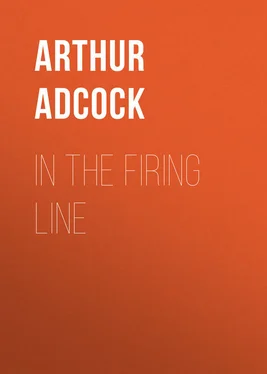Arthur Adcock - In The Firing Line
Здесь есть возможность читать онлайн «Arthur Adcock - In The Firing Line» — ознакомительный отрывок электронной книги совершенно бесплатно, а после прочтения отрывка купить полную версию. В некоторых случаях можно слушать аудио, скачать через торрент в формате fb2 и присутствует краткое содержание. Жанр: foreign_antique, foreign_prose, на английском языке. Описание произведения, (предисловие) а так же отзывы посетителей доступны на портале библиотеки ЛибКат.
- Название:In The Firing Line
- Автор:
- Жанр:
- Год:неизвестен
- ISBN:нет данных
- Рейтинг книги:3 / 5. Голосов: 1
-
Избранное:Добавить в избранное
- Отзывы:
-
Ваша оценка:
- 60
- 1
- 2
- 3
- 4
- 5
In The Firing Line: краткое содержание, описание и аннотация
Предлагаем к чтению аннотацию, описание, краткое содержание или предисловие (зависит от того, что написал сам автор книги «In The Firing Line»). Если вы не нашли необходимую информацию о книге — напишите в комментариях, мы постараемся отыскать её.
In The Firing Line — читать онлайн ознакомительный отрывок
Ниже представлен текст книги, разбитый по страницам. Система сохранения места последней прочитанной страницы, позволяет с удобством читать онлайн бесплатно книгу «In The Firing Line», без необходимости каждый раз заново искать на чём Вы остановились. Поставьте закладку, и сможете в любой момент перейти на страницу, на которой закончили чтение.
Интервал:
Закладка:
Arthur St. John Adcock
In The Firing Line / Stories of the War By Land and Sea
I
The Baptism of Fire
“ E’en now their vanguard gathers,
E’en now we face the fray. ”
The War Correspondent has become old-fashioned before he has had time to grow old; he was made by telegraphy, and wireless has unmade him. The swift transmission of news from the front might gratify us who are waiting anxiously at home, but such news can be caught in the air now, or secretly and as swiftly retransmitted so as to gratify our enemies even more by keeping them well-informed of our strength and intentions and putting them on their guard. Therefore our armies have rightly gone forth on this the greatest war the world has ever seen as they went to the Crusades, with no Press reporter in their ranks, and when the historian sits down, some peaceful day in the future, to write his prose epic of the Titanic struggle that is now raging over Europe he will have no records of the actual fighting except such as he can gather from the necessarily terse official reports, the published stories of refugees and wounded soldiers that have been picked up by enterprising newspaper men hovering alertly in the rear of the forces, and from the private letters written to their friends by the fighting men themselves.
These letters compensate largely for the ampler, more expert accounts the war correspondent is not allowed to send us. They may tell little of strategic movements or of the full tide and progress of an engagement till you read them in conjunction with the official reports, but in their vivid, spontaneous revelations of what the man in battle has seen and felt, in the intensity of their human interest they have a unique value beyond anything to be found in more professional military or journalistic documents. They so unconsciously express the personality and spirit of their writers; the very homeliness of their language adds wonderfully and unintentionally to their effectiveness; there is rarely any note of boastfulness even in a moment of triumph; they record the most splendid heroisms casually, sometimes even flippantly, as if it were merely natural to see such things happening about them, or to be doing such things themselves. If they tell of hardships it is to laugh at them; again and again there are little bursts of affection and admiration for their officers and comrades – they are the most potent of recruiting literature, these letters, for a mere reading of them thrills the stay-at-home with pride that these good fellows are his countrymen and with a sort of angry shame that his age or his safe civilian responsibilities keep him from being out there taking his stand beside them.
The courage, the cheerfulness, the dauntless spirit of them is the more striking when you remember that the vast majority of our soldiers have never been in battle until now. Russia has many veterans from her war with Japan; France has a few who fought the Prussian enemy in 1870; we have some from the Boer war; but fully three parts of our troops, like all the heroic Belgians, have had their baptism of fire in the present gigantic conflict. And it is curiously interesting to read in several of the letters the frank confession of their writers’ feelings when they came face to face for the first time with the menace of death in action. One such note, published in various papers, was from Alfred Bishop, a sailor who took part in the famous North Sea engagement of August last. His ship’s mascot is a black cat, and:
“Our dear little black kitten sat under our foremost gun,” he writes, “during the whole battle, and was not frightened at all, only when we first started firing. But afterwards she sat and licked herself… Before we started fighting we were all very nervous, but after we joined in we were all happy and most of us laughing till it was finished. Then we all sobbed and cried. Even if I never come back don’t think I died a painful death. Everything yesterday was quick as lightning.”
A wounded English gunner telling of how he went into action near Mons owns to the same touch of nervousness in the first few minutes:
“What does it feel like to be under fire? Well, the first shot makes you a bit shaky. It’s a surprise packet. You have to wait and keep on moving till you get a chance.” But as soon as the chance came, his shakiness went, and his one desire in hospital was “to get back to the front as soon as the doctor says I’m fit to man a gun. I don’t want to stop here.”
“I have received my baptism of fire,” writes a young Frenchman at the front to his parents in Paris. “I heard the bullets whistling at my ears, and saw my poor comrades fall around me. The first minutes are dreadful. They are the worst. You feel wild. You hesitate; you don’t know what to do. Then, after a time, you feel quite at your ease in this atmosphere of lead.”
“I am in the field hospital now, with a nice little hole in my left shoulder, through which a bullet of one of the War Lord’s military subjects has passed,” writes a wounded Frenchman to a friend in London. “My shoulder feels much as if some playful joker has touched it with a lighted cigar… It is strange, but in the face of death and destruction I catch myself trying to make out where the shell has fallen, as if I were an interested spectator at a rifle competition. And I was not the only one. I saw many curious faces around me, bearing expressions full of interest, just as if the owners of the respective faces formed the auditorium of a highly fascinating theatrical performance, without having anything to do with the play itself. The impression crossed my mind in one-thousandth part of a second, and was followed by numerous others, altogether alien from the most serious things which were happening and going to happen. The human mind is a curious and complicated thing. Now that we were shooting at the enemy, and often afterwards in the midst of a fierce battle, I heard some remark made or some funny expression used which proved that the speaker’s thoughts were far from realising the terrible facts around him. It has nothing to do with heartlessness or anything like that. I don’t know yet what it is. Perhaps I shall have an opportunity to philosophise on it later on.”
There is a curious comment in a letter from Sergeant Major MacDermott, who writes during the great retreat from Mons, when everybody had become inured to the atmosphere of the battlefield.
“We’re wonderfully cheerful, and happy as bare-legged urchins scampering over the fields,” he says, and adds, “It is the quantity not the quality of the German shells that are having effect on us, and it’s not so much the actual damage to life as the hellish nerve-racking noise that counts for so much. Townsmen who are used to the noise of the streets can stand it a lot better than the countrymen, and I think you will find that by far the fittest are those regiments recruited in the big cities. A London lad near me says it is no worse than the roar of motor-buses in the City on a busy day.”
But the most graphic and minutely detailed picture of the psychic experiences of a soldier plunged for the first time into the pandemonium of a modern battle is given in the Retch by a wounded Russian artillery officer writing from a St. Petersburg hospital.
“I cannot say where we fought, for we are forbidden to divulge that, but I will tell you my own experiences,” he says. “In times of peace one has no conception of what a battle really means. When war was declared our brigade was despatched to the theatre of operations. I went with delight, and so did the others. When we reached our destination we were told that the battle would begin in the morning.
Читать дальшеИнтервал:
Закладка:
Похожие книги на «In The Firing Line»
Представляем Вашему вниманию похожие книги на «In The Firing Line» списком для выбора. Мы отобрали схожую по названию и смыслу литературу в надежде предоставить читателям больше вариантов отыскать новые, интересные, ещё непрочитанные произведения.
Обсуждение, отзывы о книге «In The Firing Line» и просто собственные мнения читателей. Оставьте ваши комментарии, напишите, что Вы думаете о произведении, его смысле или главных героях. Укажите что конкретно понравилось, а что нет, и почему Вы так считаете.












